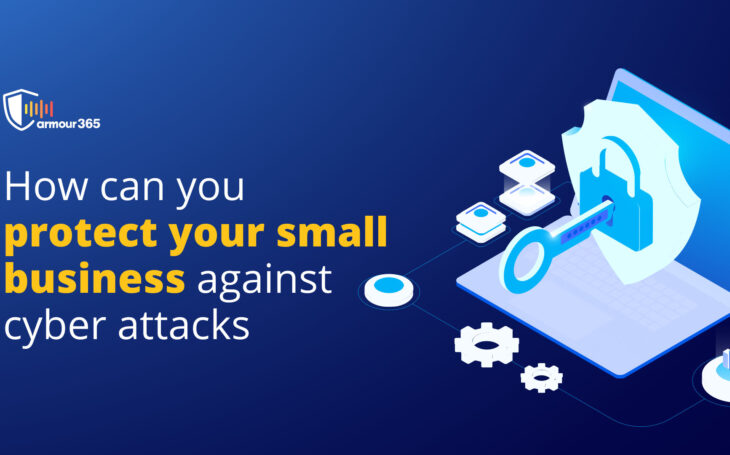
Colonial Pipeline, the largest fuel pipeline in the US, paid a ransom of $2.3 million in Bitcoins, to hackers. Guess what? It was the result of a single compromised password.
Facebook, Instagram, LinkedIn, Volkswagen & Audi, Twitch, etc., are some of the biggest names which have had data breaches in 2021.
Are hackers going after big enterprises alone? Will small businesses be left behind in these spates of attacks? Of course not.
The World Economic Forum’s 2020 Global Risk Report says that the rate of detection of cyberattacks is as low as 0.05 percent in the US. If you are a small business owner, you will be aware of the threats, but might be oblivious to how rampant it is. With many businesses working from home, cyberattacks on small businesses have only become more common.
Accenture’s Cost of Cybercrime Study says that 43% of cyber attacks are aimed at small businesses, but only 14% of them are prepared to defend the attacks. Cyber attacks on small businesses are a lot more common these days because they have fewer resources and lack the knowledge to fight back.
Here are a few more small business cyber attack statistics 2021/2022:
- Cyber attacks on small businesses mainly include phishing (57%), compromised or stolen devices (33%), and credential theft (30%), according to the State of Cybersecurity Report.
- IBM says that it takes a company 197 days to discover the breach and more than 69 days to contain it.
- 43 percent of cyber attacks target small businesses.
- Companies that contained a breach in less than 30 days saved more than $1 million.
In this article, we will look at how to protect your small business against a cyber attack.
Make Cybersecurity A Priority:
Most organizations take notice of the importance of cyber security only when they face their first cyber attack. Thanks to the pandemic, most organizations were forced to adapt to a remote environment without properly training employees or having a cybersecurity infrastructure in place, this increased the risk of exposure.
In a recent survey by Malwarebytes, more than 20% of leaders across the US said that they faced security issues because of remote workers. With more and more such attacks in the offing, SMB owners should do everything to understand the ways in which they could be vulnerable and equip themselves with resources to respond to attacks. For this, they need to make cybersecurity a priority and not treat it as an afterthought.
Train Your Employees:
A wrong click by your employee could expose your business to massive risks. SMB owners should raise awareness on the risks that their organizations carry. Your first line of defense are your employees. They are the ones who can contribute to your cybersecurity efforts.
Below are a few things that can be done to strengthen your cyber security:
- Install the latest updates and patches for the software that your organization uses.
- Train your employees to follow good browsing practices and how to maintain a good cyber hygiene
- Create strong passwords and do not download suspicious links
- Identify suspicious activity from unknown sources
Get A Good Cyber Insurance Policy:
It is always best to be prepared for the worst. What if there is a cyber attack and you end up losing a lot of company resources, sensitive data, and money? Our advice on how to protect your small business against a cyber attack also involves requesting you to reduce the risks of operating a business by taking cyber insurance.
If there are cyberattacks, your cyber insurance will at least let you recover from any financial losses and help you prepare for the next stages. Work only with cyber insurance companies that have a proven track record of handling SMBs like yours. There are cyber insurance plans that will be easy on your pockets. It is better to be safe than sorry, especially when it comes to something as uncertain as attacks from faceless entities.
Use Voice Biometrics Authentication:
According to The Global Risks Report 2021 by the World Economic Forum, cybercrime has the potential of causing more risk to society than terrorism. The power of AI is needed in this deepfake era.
Voice biometrics is proving to be a better solution for user authentication. By measuring the sound that a user makes while speaking, voice biometrics will authenticate the voice. Voice biometrics authentication is a superior authentication solution that offers a secure voiceprint technology to eliminate the manual authentication process.
It also lowers the support overheads and enhances security by requiring users to identify themselves by saying a phrase or word. The voice biometric system is also capable of authenticating users in the fastest time possible, thereby providing them a frictionless experience.
Encrypt Important Information:
Whenever you store data or send it online, ensure that your network encryption is on. Encryption converts your data into a secret code before you send it to a third-party. If encrypted data goes into the wrong hands, they will not be able to figure out what its contents are. The settings on your router can be used for encryption or you can install a Virtual Private Network (VPN) on your device whenever a public network is being used.
Enable Multi-factor Authentication (MFA):
It is a strong way to reduce cyber attacks as MFA asks you to provide two or more identity proofs to access the account. For example, a system might ask for a code and a password that is sent to your smartphone or your email before it grants access. Thanks to this additional layer of security, attackers will find it difficult to gain access.
According to Google, even a two-step verification can stop 100% of automated attacks, three-quarters of targeted attacks, and 96% of bulk phishing attacks.
Implement Procedures On Responding To Threats:
You need a solid set of procedures to prevent, identify and respond to cyber attacks. Cyber attacks on small businesses cannot be thwarted just by installing anti-virus software or updating all your software. Create a policy that governs when and how security updates can be installed. Restrict access to inappropriate websites to lessen malware exposure.
Provide more protection to your networks, especially wireless networks, with the help of firewalls, access lists, proxies, etc. Always encrypt sensitive data in a way that only authorized users can access it. Each of these steps will increase the chances of putting a full stop to cyber attacks against your organization.
With cyber attacks on small businesses becoming more and more common, steps should be taken to protect one’s data and assets. SMB owners need to understand the vulnerabilities that they might be exposing their business to and develop a cybersecurity plan that would involve employees as well as putting a program in place.
When you are working on how to protect your small business against a cyber attack, you cannot leave anything to chance. Leverage the right mix of policies, tools, and procedures to minimize your risk as much as possible. When you do that, you will be better prepared to face any attacks.




